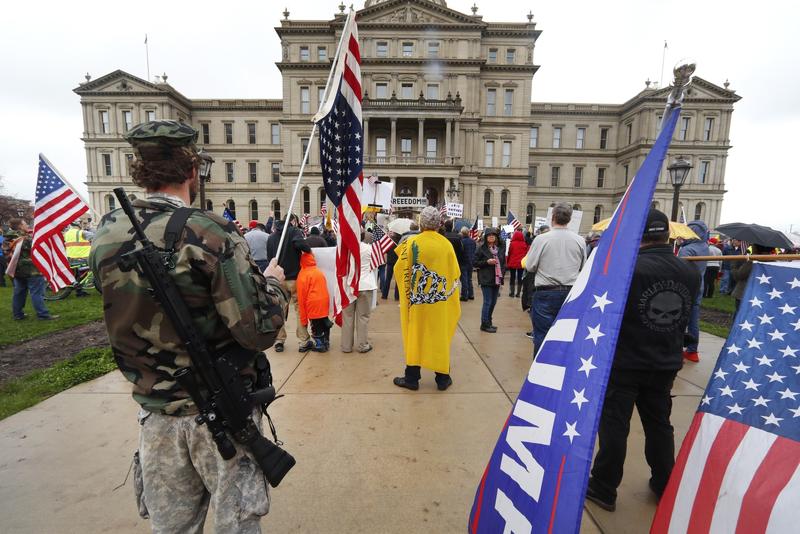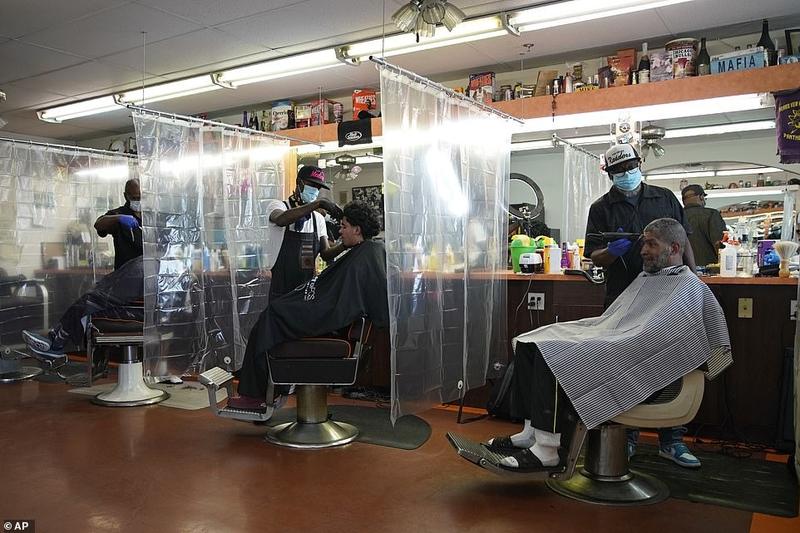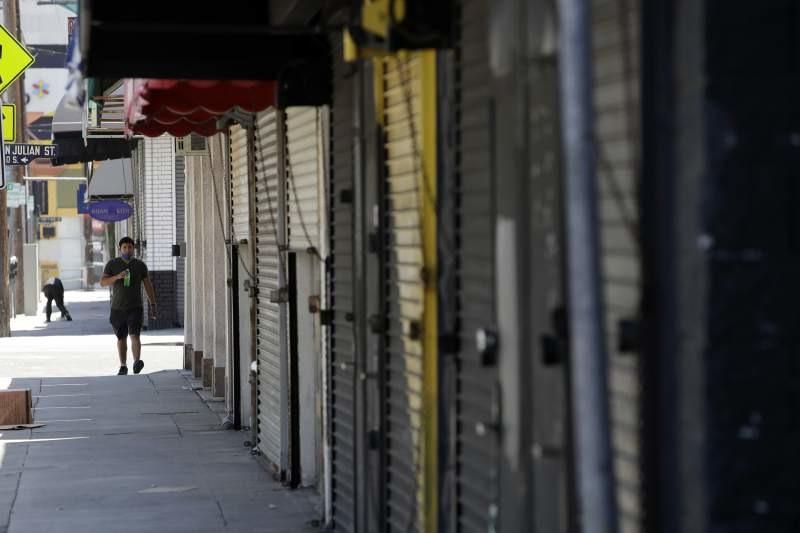Return to business generates heated protests, debate
 Protesters demonstrate in Lansing, Michigan, denouncing Governor Gretchen Whitmer's stay-home order and business restrictions. (PAUL SANCYA / AP)
Protesters demonstrate in Lansing, Michigan, denouncing Governor Gretchen Whitmer's stay-home order and business restrictions. (PAUL SANCYA / AP)
Snuffer's Restaurant & Bar in Dallas, Texas, served its legendary burgers and cheddar fries again last weekend.
Two Rhode Island drive-in movie theaters were scheduled to reopen on Friday, and on Wednesday in the town of Washington, Connecticut, people will be allowed to eat outdoors again at the George Washington Tavern.
In Texas, Rhode Island, Connecticut and more than 30 other states across the United States, the reopening of the country from restrictions put in place to stem the COVID-19 pandemic is underway.
But a hodgepodge of rules that vary by counties and cities within those states-along with a sharp divide among elected officials on when and how to resume business-reflects a "two Americas" reopening.
There is a real risk that you will trigger an outbreak that you might not be able to control, not only leading to some suffering and death, but it could even set you back on the road to economic recovery
Anthony Fauci, director of the National Institute of Allergy and Infectious Diseases in the US
Polls show a political divide on reopening, with Republicans led by US President Donald Trump, generally favoring opening up quickly, while Democrats support gradual reopenings.
Since March, the pandemic has put more than 300 million people behind doors under differently named directives, such as "stay-at-home", "stay safe" and "pause".
The inability of many US citizens to put food on the table, along with economic stagnancy, has spawned resentment and placed pressure on governors across the country to ease restrictions.
As in the rest of the pandemic-stricken world, COVID-19 in the US is a story of loss.
The death toll from the virus in the country has surpassed 81,000, according to the COVID Tracking Project, including at least 28,000 residents and workers at nursing homes and other long-term care facilities.
Last month, the unemployment rate soared to 14.7 percent-the highest since the Great Depression-having stood at 3.5 percent just two months earlier.
ALSO READ: US working on boosting relief funds
Some 33 million new unemployment claims have been made in the past two months, while business losses total billions of dollars.
More than 100,000 small businesses have shut permanently since the pandemic escalated in March, according to a study by researchers at the University of Illinois, Harvard Business School, Harvard University and the University of Chicago.
In the restaurant industry, 3 percent of operators have gone out of business, according to the National Restaurant Association.
As governors reopen their states and ease restrictions, they face questions of choice and risk, such as how much of public life should be reopened? And most important, will reopening lead to a new wave of the virus and even greater loss?
The answers could determine the health of 328 million people and a US$22 trillion economy.
 Customers are separated by plastic sheeting as a barber shop in Las Vegas, Nevada, reopens on May 9. (JOHN LOCHER / AP)
Customers are separated by plastic sheeting as a barber shop in Las Vegas, Nevada, reopens on May 9. (JOHN LOCHER / AP)
J. Stephen Morrison, senior vice-president of the Center for Strategic and International Studies, said, "We are in the midst of a very murky and confusing transition here in the United States, as federal guidance has been lifted and many states begin to reopen their economies.
"There remains deep tension between public health safety on the one hand and a desire-understandable desire-to exit the economic crisis and see a reopening of business and schools. The American public remains very uneasy about premature lifting of shelter-in-place."
On Tuesday, Anthony Fauci, director of the National Institute of Allergy and Infectious Diseases and a member of the White House coronavirus team, warned about opening too fast.
"There is a real risk that you will trigger an outbreak that you might not be able to control, not only leading to some suffering and death, but it could even set you back on the road to economic recovery," he told a US Senate health committee.
READ MORE: Half of US states easing virus restrictions, Russia cases surge
Trump has acknowledged that there might be more deaths from COVID-19 during reopening.
New York state has been the hardest-hit area of the country by the coronavirus, with more than 340,600 cases, nearly 25 percent of all those in the US, and more than 26,600 deaths
"It's possible there will be some, because you won't be locked into an apartment or a house or whatever it is," he said in a television interview. "But at the same time, we're going to practice social distancing, we're going to be washing hands, we're going to be doing a lot of the things that we've learned to do over the last period of time."
Economy versus lives
In New York state, Democratic Governor Andrew Cuomo has said the national debate over when to reopen outbreak-ravaged economies ultimately boils down to the value placed on people's lives.
His state has been the hardest-hit area of the country by the coronavirus, with more than 340,600 cases, nearly 25 percent of all those in the US, and more than 26,600 deaths.
"How much is a human life worth?" Cuomo asked on May 5 at his daily news briefing. "That's the real discussion that no one is admitting openly or freely. But we should."
Cuomo has stood firm with an approach that will allow parts of his state to phase in economic activities if they meet and maintain a series of benchmarks.
"We're now on the other side of the mountain," he said on Monday, referring to the number of coronavirus cases declining."Next step: How do we reopen? How do we reopen intelligently and how do we reopen without taking a step back."
Avoiding that "step back" is the focus of concern among states that have reopened and those moving toward doing so. They are looking to testing to safeguard their moves, and even the development of a vaccine to fight any surge in infections.
But Fauci warned that a vaccine will not be ready in time for the new school year and said the country still lacks an adequate contact-tracing infrastructure to monitor the spread of COVID-19.
 Stores are shuttered in the fashion district of Los Angeles on May 4. Amid defiance from local governments, California Governor Gavin Newsom said that some businesses could reopen as early as May 8, as long as restrictions were enforced to prevent the virus spreading. (MARCIO JOSE SANCHEZ / AP)
Stores are shuttered in the fashion district of Los Angeles on May 4. Amid defiance from local governments, California Governor Gavin Newsom said that some businesses could reopen as early as May 8, as long as restrictions were enforced to prevent the virus spreading. (MARCIO JOSE SANCHEZ / AP)
The day before Fauci testified, Trump declared, "We have met the moment, and we have prevailed (on testing)". He said the US is conducting about 300,000 coronavirus tests a day.
But many experts say the level of testing continues to fall short of what is needed to reopen the country safely. Harvard University's Global Health Institute has estimated that the US needs to be conducting about 900,000 daily tests.
Jeffrey Shaman, an epidemiologist at Columbia University, said: "We don't have the resources in place to do the level of testing and contact tracing we need to make sure we're monitoring this effectively. We're flying blind."
On Monday, Trump said his administration would distribute US$11 billion to states to facilitate testing, adding that the US should pass 10 million completed tests this week, "nearly double the number of any other country".
As of Sunday, the US had completed nearly 9 million coronavirus tests, according to the COVID Tracking Project. The figure is equivalent to just 2.74 percent of the country's population, and there are far higher levels of per-capita testing in other parts of the world.
READ MORE: US deaths forecast to surge
While more US citizens now say the country has seen the worst of the outbreak, some 80 percent of respondents last month said that strict shelter-in-place measures are worthwhile in order to protect people and limit the spread of the virus, according to a poll by the Kaiser Family Foundation.
Fewer than 19 percent of respondents said these strict measures are placing unnecessary burdens on people and the economy, causing more harm than good.
A divided nation
From start of lockdowns, several states-almost all run by Democratic governors-have come under fire from Trump, business groups and protesters who have showed up at state capitols demanding the restrictions end.
Trump urged governors to reopen by May 1, and tweeted that citizens should "liberate" states whose leaders have ordered people to stay home.
Last month, demonstrations against lockdowns were staged at state capitols in at least six states.
The most-fervent protests have arguably been in Michigan, where multiple rallies have been held against social distancing policies introduced by Governor Gretchen Whitmer, a Democrat.
In a demonstration on April 30, some protesters with guns-which are allowed in the statehouse-moved inside the building and went to the Senate gallery, where one senator said some armed men shouted at her, and that some senators wore bulletproof vests. The protesters held signs stating "No work no freedom" and "Tyrants get the rope".
From start of lockdowns, several states-almost all run by Democratic governors-have come under fire from Trump, business groups and protesters who have showed up at state capitols demanding the restrictions end
Trump encouraged protesters in Michigan, Minnesota and Virginia who violated stay-at-home orders and social distancing guidelines to march against Democratic governors.
On April 17, he tweeted: "LIBERATE MICHIGAN!" "LIBERATE MINNESOTA." "LIBERATE VIRGINIA."
Protesters also received a boost from US Attorney General William Barr, who described some stay-at-home orders as "burdens on civil liberties" and said that if they continued and lawsuits were brought, his department would side against a state.
"The idea that you have to stay in your house is disturbingly close to house arrest. I'm not saying it wasn't justified. I'm not saying in some places it might still be justified. But it's very onerous, as is shutting down your livelihood," Barr said in a radio interview.
Trump continues to back protesters. On Monday, he gave his support to Republican officials in about half a dozen Pennsylvania counties who said they would ignore Governor Tom Wolf's phased reopening plan and reopen their counties ahead of the state's schedule. Wolf, a Democrat, has said counties that defy his order could face consequences.
Trump tweeted, "The great people of Pennsylvania want their freedom now, and they are fully aware of what that entails." He also said that more Democrats were seeking political advantage in an election year by reopening their states slowly. In 2016, the president won Pennsylvania, a key swing state, by just 44,000 votes.
READ MORE: Trump says US must reopen even if more Amercians die
On Monday, Trump tweeted his support for Tesla CEO Elon Musk, who is restarting his assembly plant in Fremont, California, amid the pandemic, despite not receiving approval from local government officials.
Tesla has sued the county health department, seeking to overturn its order, and Musk has threatened to move the company's manufacturing operations and headquarters from the state.
As for the two drive-in theaters reopening in Rhode Island-the Rustic and the Misquamicut-they are taking precautions to prevent the virus spreading.
Face masks must be worn at all times when outside a vehicle, and concession stand orders can now be phoned in. Cars will be socially distanced, so that anyone leaving a vehicle will not come within 6 feet (1.82 meters) of someone else in an adjacent car exiting theirs.
The Misquamicut charges US$27 per vehicle load, and historically there has been no limit on the number of people per car. There is no word yet on whether such a number will be regulated in light of the pandemic, or if a car's occupants have to be from the same family or live together.
The theater, which is showing Jaws this weekend, has already sold out Friday and Saturday, according to its Facebook page. Next weekend, it is screening Jaws 2, and that is already a sellout.
Meanwhile, stay-at-home orders in Los Angeles County will, "with all certainty", be extended for the next three months, county Public Health Director Barbara Ferrer said during a Board of Supervisors meeting on Tuesday.
Zhao Huanxin in Washington and Teresa Liu in Los Angeles contributed to this story.


